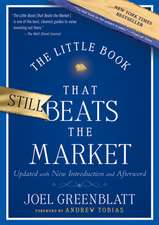Stochastic Portfolio Theory: Stochastic Modelling and Applied Probability, cartea 48
Autor E. Robert Fernholzen Limba Engleză Hardback – 12 apr 2002
Stochastic portfolio theory has both theoretical and practical applications: as a theoretical tool it can be used to construct examples of theoretical portfolios with specified characteristics and to determine the distributional component of portfolio return. On a practical level, stochastic portfolio theory has been the basis for strategies used for over a decade by the institutional equity manager INTECH, where the author has served as chief investment officer.
This book is an introduction to stochastic portfolio theory for investment professionals and for students of mathematical finance. Each chapter includes a number of problems of varying levels of difficulty and a brief summary of the principal results of the chapter, without proofs.
| Toate formatele și edițiile | Preț | Express |
|---|---|---|
| Paperback (1) | 573.44 lei 6-8 săpt. | |
| Springer – 3 dec 2010 | 573.44 lei 6-8 săpt. | |
| Hardback (1) | 582.95 lei 6-8 săpt. | |
| Springer – 12 apr 2002 | 582.95 lei 6-8 săpt. |
Din seria Stochastic Modelling and Applied Probability
- 17%
 Preț: 464.60 lei
Preț: 464.60 lei - 18%
 Preț: 805.44 lei
Preț: 805.44 lei - 18%
 Preț: 1110.72 lei
Preț: 1110.72 lei - 18%
 Preț: 947.35 lei
Preț: 947.35 lei -
 Preț: 390.84 lei
Preț: 390.84 lei - 18%
 Preț: 952.40 lei
Preț: 952.40 lei - 15%
 Preț: 648.56 lei
Preț: 648.56 lei - 18%
 Preț: 951.91 lei
Preț: 951.91 lei - 15%
 Preț: 637.13 lei
Preț: 637.13 lei - 18%
 Preț: 793.63 lei
Preț: 793.63 lei -
 Preț: 391.02 lei
Preț: 391.02 lei -
 Preț: 401.42 lei
Preț: 401.42 lei - 15%
 Preț: 639.08 lei
Preț: 639.08 lei - 18%
 Preț: 733.33 lei
Preț: 733.33 lei - 18%
 Preț: 785.11 lei
Preț: 785.11 lei - 15%
 Preț: 593.42 lei
Preț: 593.42 lei - 18%
 Preț: 1114.96 lei
Preț: 1114.96 lei - 15%
 Preț: 643.16 lei
Preț: 643.16 lei -
 Preț: 390.63 lei
Preț: 390.63 lei - 15%
 Preț: 645.60 lei
Preț: 645.60 lei - 15%
 Preț: 641.71 lei
Preț: 641.71 lei - 18%
 Preț: 954.62 lei
Preț: 954.62 lei - 15%
 Preț: 645.14 lei
Preț: 645.14 lei - 18%
 Preț: 947.50 lei
Preț: 947.50 lei - 18%
 Preț: 804.96 lei
Preț: 804.96 lei - 15%
 Preț: 644.63 lei
Preț: 644.63 lei - 20%
 Preț: 469.59 lei
Preț: 469.59 lei - 20%
 Preț: 581.39 lei
Preț: 581.39 lei
Preț: 582.95 lei
Preț vechi: 685.83 lei
-15% Nou
Puncte Express: 874
Preț estimativ în valută:
111.55€ • 116.70$ • 92.66£
111.55€ • 116.70$ • 92.66£
Carte tipărită la comandă
Livrare economică 02-16 aprilie
Preluare comenzi: 021 569.72.76
Specificații
ISBN-13: 9780387954059
ISBN-10: 0387954058
Pagini: 178
Ilustrații: XIV, 178 p.
Dimensiuni: 156 x 234 x 14 mm
Greutate: 0.39 kg
Ediția:2002
Editura: Springer
Colecția Springer
Seria Stochastic Modelling and Applied Probability
Locul publicării:New York, NY, United States
ISBN-10: 0387954058
Pagini: 178
Ilustrații: XIV, 178 p.
Dimensiuni: 156 x 234 x 14 mm
Greutate: 0.39 kg
Ediția:2002
Editura: Springer
Colecția Springer
Seria Stochastic Modelling and Applied Probability
Locul publicării:New York, NY, United States
Public țintă
ResearchCuprins
1 Stochastic Portfolio Theory.- 2 Stock Market Behavior and Diversity.- 3 Functionally Generated Portfolios.- 4 Portfolios of Stocks Selected by Rank.- 5 Stable Models for the Distribution of Capital.- 6 Performance of Functionally Generated Portfolios.- 7 Applications of Stochastic Portfolio Theory.- Appendix A. Evaluation of Local Times.- References.
Recenzii
From the reviews:
MATHEMATICAL REVIEWS
"We recommend this monograph to all researchers and graduate students in mathematical finance; it is easy to read, self-contained, not boring at all, and with lots of ideas for further research."
"The monograph introduces stochastic portfolio theory, a novel mathematical framework for analyzing portfolio behavior and equity market structure, and which is intended for investment professionals and students of mathematical finance. … We recommend this monograph to all researchers and graduate students in mathematical finance; it is easy to read, self-contained, not boring at all, and with lots of ideas for further research." (Gheorghe Stoica, Mathematical Reviews, 2003 a)
"This book develops a descriptive theory of portfolios in financial markets. … It can be used as a theoretical tool to provide insight into questions of market equilibrium and arbitrage, and to construct portfolios with controlled behaviour. In practice, it can be applied to portfolio optimization and performance analysis, and the tools developed will be useful for these purposes. … it will help to understand why certain investment strategies produce certain results … ." (Martin Schweizer, Zentralblatt MATH, Vol. 1049, 2004)
MATHEMATICAL REVIEWS
"We recommend this monograph to all researchers and graduate students in mathematical finance; it is easy to read, self-contained, not boring at all, and with lots of ideas for further research."
"The monograph introduces stochastic portfolio theory, a novel mathematical framework for analyzing portfolio behavior and equity market structure, and which is intended for investment professionals and students of mathematical finance. … We recommend this monograph to all researchers and graduate students in mathematical finance; it is easy to read, self-contained, not boring at all, and with lots of ideas for further research." (Gheorghe Stoica, Mathematical Reviews, 2003 a)
"This book develops a descriptive theory of portfolios in financial markets. … It can be used as a theoretical tool to provide insight into questions of market equilibrium and arbitrage, and to construct portfolios with controlled behaviour. In practice, it can be applied to portfolio optimization and performance analysis, and the tools developed will be useful for these purposes. … it will help to understand why certain investment strategies produce certain results … ." (Martin Schweizer, Zentralblatt MATH, Vol. 1049, 2004)
Textul de pe ultima copertă
Stochastic portfolio theory is a novel mathematical framework for constructing portfolios, analyzing the behavior of portfolios, and understanding the structure of equity markets. This new theory is descriptive as opposed to normative, and is consistent with the observed behavior and structure of actual markets. Stochastic portfolio theory is important for both academics and practitioners, for it includes theoretical results of central importance to modern mathematical finance, a well as techniques that have been successfully applied to the management of actual stock portfolios for institutional investors. Of particular interest are the logarithmic representation stock prices for portfolio optimization; portfolio generating functions and the existence of arbitrage; and the use of ranked market weight processes for analyzing equity market structure.
For academics, the book offers a fresh view of equity market structure as well as a coherent exposition of portfolio generating functions. Included are many open research problems related to these topics, some of which are probably appropriate for graduate dissertations.
For practioners, the book offers a comprehensive exposition of the logarithmic model for portfolio optimization, as well as new methods for performance analysis and asset allocation.
E. Robert Fernholz is Chief Investment Officer of INTECH, an institutional equity manager. Previously, Dr. Fernholz taught mathematics and statistics at Princeton University and the City University of New York.
For academics, the book offers a fresh view of equity market structure as well as a coherent exposition of portfolio generating functions. Included are many open research problems related to these topics, some of which are probably appropriate for graduate dissertations.
For practioners, the book offers a comprehensive exposition of the logarithmic model for portfolio optimization, as well as new methods for performance analysis and asset allocation.
E. Robert Fernholz is Chief Investment Officer of INTECH, an institutional equity manager. Previously, Dr. Fernholz taught mathematics and statistics at Princeton University and the City University of New York.
Caracteristici
Author has served as chief investment officer for INTECH, where this theory has been the basis for investment strategies for over a decade Provides an introduction to this innovative theory and its applications











